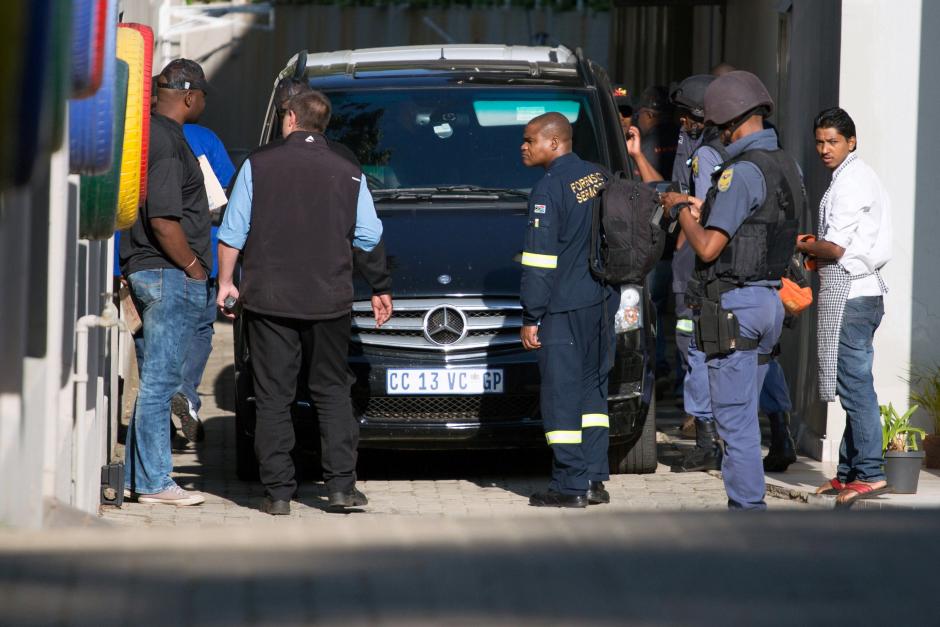JOHANNESBURG, (Reuters) – Heavily armed South African police raided the luxury home of the Gupta family today as part of a probe into allegations the three brothers had corrupt links to President Jacob Zuma, who has been ordered by the ruling ANC to quit as head of state.
The raid marks a dramatic escalation in the pressure on Zuma and the political faction around him accused of milking state resources for their own ends. It remains unclear whether the 75-year-old will throw in the towel, or dig in deeper.
The early morning raid, which the police’s elite Hawks unit said resulted in three arrests, took place amid reports Zuma was preparing to tell South Africa he was stepping down after nine years in office dogged by scandal and economic stagnation.

The SABC, South Africa’s state broadcaster, said a Gupta family member was among those detained. A senior judicial source said police expected to arrest up to seven more people and that top Gupta family members would be among them.
“You can’t bring a matter of this nature to court and not charge the people who have benefitted the most,” the source, who has knowledge of the police’s moves, told Reuters.
Zuma and the Guptas – a family of wealthy Indian-born businessmen – deny any wrongdoing. A lawyer for the Gupta family said he could not comment on the raid because he had yet to see the search warrant.
Meanwhile, there was chaos and confusion at Pretoria’s Union Buildings, the official seat of government, over reported plans for Zuma to address the country.
Finance Minister Malusi Gigaba said Zuma would speak at 0800 GMT and satellite trucks were in position overnight. However, Zuma’s office denied there had been any “official communication” of an address and the scheduled time came and went.
Adding to the mystery, a copy of an email, purportedly from deputy presidential communications director Shadi Baloyi, circulated on Twitter telling Pretoria police that plans for a “special media briefing” by Zuma at 0800 GMT had been cancelled.
“Kindly ignore my earlier request, as the briefing will not take place tomorrow,” Baloyi wrote. Reuters could not confirm the email’s authenticity and Baloyi did not answer her phone or respond to text messages.
Zuma’s spokesman did not answer his phone.
“CRIME SCENE”
The document was just one of the many dramas gripping Pretoria and Johannesburg, South Africa’s political and commercial capitals, as the net closed in on Zuma and his allies.
Shortly after dawn, a dozen officers from the elite Hawks police unit sealed off a street leading to the Gupta mansion in Johannesburg’s upscale Saxonwold suburb. One officer blocked access to Reuters, saying: “This is a crime scene.”
Minutes later, an unmarked police van left the compound as residents applauded police officers and hurled abuse at security guards for the Guptas, who have been accused by South Africa’s top anti-corruption watchdog of influence-peddling and swaying the appointment of cabinet ministers.
“Finally something is being done about it. These guys must get out of our country. They must leave us alone. They have done enough damage,” said Tessa Turvey, head of the local residents’ association, standing outside the compound’s iron gates.
Police also raided the Guptas’ Oakbay holding company in Johannesburg’s Sandton financial district, according to a security guard outside the building.
On Tuesday, the ruling African National Congress (ANC) ordered Zuma to step down as president of the country, giving him no firm deadline but saying the party was sure he would comply and “respond” on Wednesday.
Hawks spokesman Hangwani Mulaudzi said the raid was part of a probe into influence-peddling allegations that are also the focus of a judicial inquiry into wider corruption involving the Guptas, dubbed “state capture” in local media.
“We’re not playing around in terms of making sure that those who are responsible in the so-called state capture, they take responsibility for it,” Mulaudzi said.
He declined to give details of what was seized or if the business premises of the Guptas, whose commercial empire stretches from mining to media, would also be raided.
Under South African law, suspects cannot be named until they appear in court.
POWER STRUGGLE?
Signs of law enforcement mobilising against the Guptas – and by association Zuma – caused the rand to strengthen 0.5 percent against the dollar. The currency has tended to gain ground on any sign of Zuma’s political departure approaching.
Zuma’s silence has fuelled speculation of an increasingly desperate power struggle behind the scenes with deputy president Cyril Ramaphosa, whose election to the head of the ANC in December marked the beginning of the end of Zuma’s tenure.
Besides his controversial relationship with the Guptas, who moved to South Africa from India in the early 1990s, Zuma has 783 counts of corruption outstanding against him relating to a $2.5 billion state arms deal in the late 1990s.
Besides the pressure from the ANC, Zuma is facing a no-confidence motion in parliament brought by the opposition Economic Freedom Fighters. That motion is set for Feb. 22.
The ANC could throw its weight behind such a vote if Zuma, who has survived several no-confidence motions in the past, refused to heed its orders to resign. The entire Cabinet would have to step down if such a vote went through.





